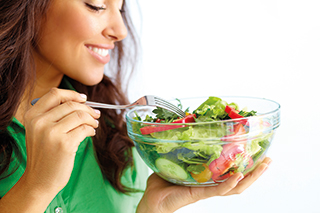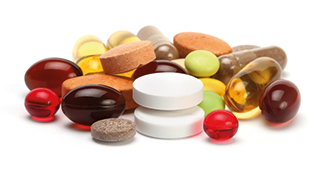Vitamins A-Z

The Rude Health guide to vitamins
The modern diet
Aine Keane owner of The Good Earth in Kilkenny: “If you look at how our food is grown – the soil is depleted in minerals so our food does not contain all the minerals that it should. Eating a processed diet would lead us to be deficient in vitamin C and B vitamins which are abundant in wholegrain foods such as brown rice, couscous and millet.”
Jill Bell of Well and Good in Midleton, Co Cork: “Unfortunately the people who most need dietary advice in a health store are the people we never see – those whose supermarket trolleys are laden with salty processed foods, fizzy drinks, sugary breakfast cereals etc. They are lacking antioxidant vitamins and minerals, often low in iron and magnesium, missing out on B vitamins and vitamin D, and are often lacking energy, overweight and malnourished.”
The role of vitamins
Jill Bell: “Picky children, recovering invalids, older people whose bodies don’t produce digestive enzymes or gut bacteria as they used to, and people with particular needs such as lack of magnesium or iron, will benefit from supplementation. We would always suggest dietary changes to maximise nutrient intake before taking any supplement.”
Aine Keane: “A pregnant woman would possibly need extra iron from green vegetables and supplements, athletes could benefit from including more protein in their diets and also magnesium would be helpful for muscle health. Someone that is stressed would benefit greatly from a B complex. A daily multivitamin ensures that we are getting what we need to keep our bodies healthy. Health stores have years of experience of selling vitamins and getting feedback from customers; they take time to identify which nutrients would suit them best.”
Special support
Lucy Kerr works at the Good Earth in Kilkenny: “Take vitamin C for colds and flu, vitamin E for skin repair, zinc for immune health and reproductive support. When studying for exams take B vitamins, zinc, magnesium, L-Theanine or passionflower and most importantly omega oils which feed our brains. Vitamin D helps our mood, immune system and aids absorption of calcium and many people need to take a supplement in the winter.”
Jill Bell: “Increasingly customers are choosing encapsulated vitamins and minerals which are easily broken down and absorbed.”

Vitamins from A to Z
Vitamin A – keeps eyes in good condition and boosts the immune system. Found in cheese, eggs, oily fish, milk, fortified low-fat spreads and yogurt.
Vitamin B1 (thiamine) – essential for energy. Found in whole grains, seafood and beans.
Vitamin B2 (riboflavin) – keeps skin, hair and nails healthy and also good for eyesight. Found in some cheeses, almonds, oily fish, eggs, mushrooms and sesame seeds.
Vitamin B3 (niacin) – helps lower cholesterol and aids digestion. Found in beetroot, brewer’s yeast, salmon, tuna, sunflower seeds, fortified bread and cereals.
Vitamin B9 (folic acid, folate) – important for growth. Found in green vegetables and fortified foods such as cereals and bread.
Vitamin B12 (cobalamin) – good for supporting blood cell and nerve growth. Found in liver, oily fish, dairy and eggs.
Biotin (vitamin H) – good for skin, hair and nails. Found in liver, eggs and nuts.
Vitamin C (ascorbic acid) – important antioxidant for protecting body from free radicals. Found in fresh fruit and vegetables.
Vitamin D (calciferol) – keeps bones, muscles and teeth healthy. Created by the body when exposed to sun and found in oily fish, eggs, fortified fat spreads and breakfast cereals, and powdered milk.
Vitamin E (tocopherol) – important for energy and sex drive. Found in soya, corn and olive oil, nuts and seeds, wheat germ and cereals.
Vitamin K – important for blood clotting and building bones. Found in green leafy vegetables, such as broccoli and spinach, vegetable oils and cereals.
Click here to read earlier Rude Health Magazine natural health articles.
Click here to read the latest issue of Rude Health Magazine.